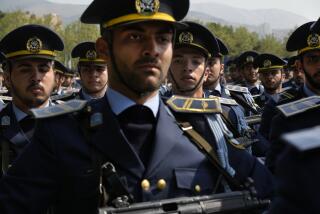Iraq Doesn’t Scare Israelis, But Alliance Would : Strategy: Military planners fear no single Arab nation. They do see a threat in a future war combining nations such as Syria and Jordan.
TEL AVIV — As they look at the current Persian Gulf crisis, the main concern of Israeli military planners is a future war involving the combined forces of several Arab nations aligned against the Jewish state.
They do not see Iraq on its own attacking Israel--the retaliation would be swift and destructive. But they do worry if Baghdad should somehow link up with Jordan and perhaps settle differences with Syria. As a result, the planners in the Israel Defense Forces (IDF) are looking once again at the possibility of a large-scale conventional conflict.
In rejecting the prospect of Iraq acting alone against Israel, Defense Minister Moshe Arens noted that Iraqi long-range missiles do not yet have the capability of carrying chemical weapons in their warheads.
Thus, according to senior officers, no single Arab nation--not even Iraq--poses a vital threat to Israel.
“But if Iraq should combine with Jordan, and somehow link Syria in an alliance on the Eastern Front,” said an IDF general officer, “then we would be looking at a major threat.
“We would still have the capability to win against them, but it would be much more difficult.” As Joseph Alpher, deputy director of Tel Aviv’s Jaffee Center for Strategic Studies, put it, “If war comes, it will be potentially far more destructive of Israel’s civilian population than previous wars.”
Israel’s chief planners still regard Syria--with 4,000 tanks, 2,500 artillery pieces, and 510 combat aircraft--as the most immediate threat.
“They are very close to Israel, only minutes to reach our border, and could try to launch a surprise attack, as they did in the Yom Kippur War in 1973.”
Further, Syria still seeks to regain the Golan Heights lost to Israel in the 1967 war and currently is attempting to attain strategic parity with Israel, according to the military experts.
“More dangerous would be a combination of Syria and Jordan--which has a good army and more than 1,100 tanks along our eastern border over the Jordan River,” said a military planner.
“But most dangerous would be Jordan and Iraq getting together with Syria. But King Hussein (of Jordan) has been warned about how we would view his allowing Iraqi troops on his soil.”
Israeli military officers hope that Jordan learned its lesson in 1967, when it lost all of the West Bank, and has been currently warned that if it attacks, there would be little left of its capital Amman or the Hashemite Kingdom.
If Iraq were to move its divisions westward, the Israeli Air Force would bomb formations long before they reached the Eastern Front, a general warned. “We are lucky that Iraq’s Saddam Hussein and Syria’s (President) Hafez Assad are bitter enemies,” he said.
Most worrisome of all would be a diplomatic falling out with Egypt, for if peace with the largest Arab nation on Israel’s southern flank should somehow be shattered, Israel would again be surrounded by enormous military odds.
“We don’t see that happening now,” said a high-ranking officer. “But we Israelis always worry about what we call the ‘bullet scenario.’ Most Arab regimes are led by one man. An assassination could change the nation’s entire policy toward us. Unfortunately, we cannot exclude this from our thinking.”
In any major conflict, Israel feels that it must win before its resources and morale are drained and other Arab states have the chance of joining in. As a result, it must not only keep heavy armored units deployed near borders, but it also needs infantry to quell the Palestinian uprising, the intifada, at home.
To remain ready for any contingency, the Israeli military has concentrated on highly trained forces manning high-technology equipment. Officers say they also have the most advanced early-warning system, calculated to give headquarters plenty of notice of an Arab military build-up.
“But quality costs a lot of money,” said a two-star general on the IDF staff. “And we are already facing cuts in the defense budget. So we may have to reduce our manpower slightly in order to maintain our level of training and weapons research.”
More to Read
Sign up for Essential California
The most important California stories and recommendations in your inbox every morning.
You may occasionally receive promotional content from the Los Angeles Times.










